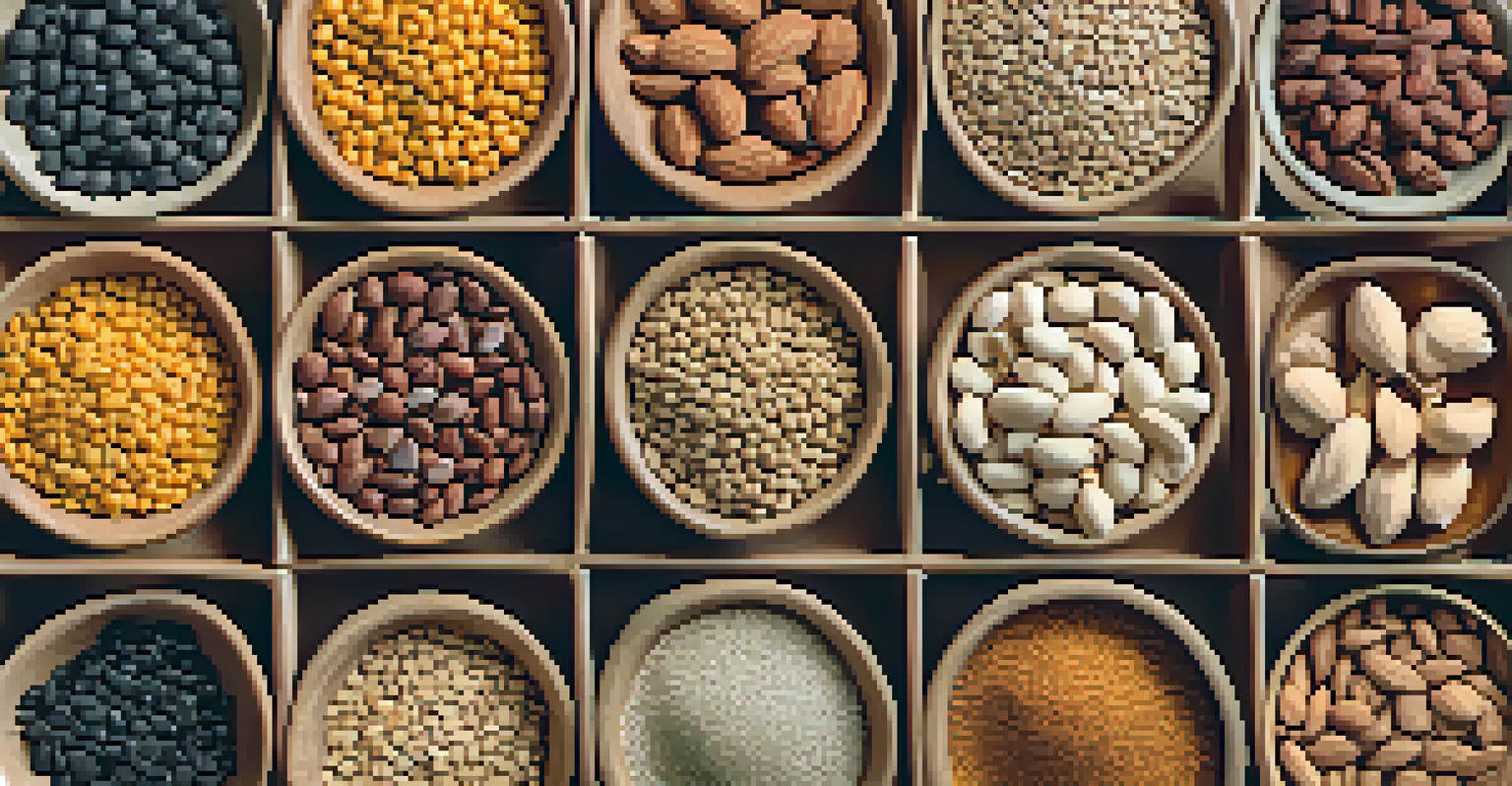Understanding Macronutrients in Plant-Based Diets

What Are Macronutrients and Why They Matter
Macronutrients are the nutrients our bodies need in larger amounts to function properly. They include carbohydrates, proteins, and fats, each playing a unique role in our overall health. Understanding these macronutrients is crucial, especially in a plant-based diet, where sources may differ from traditional animal-based options.
Let food be thy medicine and medicine be thy food.
For instance, while animal products are rich in protein, plant-based sources like legumes, nuts, and seeds also provide ample protein. This shift in food sources means we need to pay close attention to our intake to ensure we meet our nutritional needs. In essence, knowing what macronutrients are and their significance helps to create a balanced and nourishing diet.
So, whether you're a long-time vegan or simply exploring plant-based eating, grasping the basics of macronutrients will empower you to make informed dietary choices.
Carbohydrates: The Body's Primary Energy Source
Carbohydrates are often misunderstood, but they are our body's primary energy source. In a plant-based diet, you'll find carbohydrates in whole grains, fruits, and vegetables, all of which come packed with vitamins and minerals. These foods not only fuel your body but also provide dietary fiber, which is essential for digestive health.

When choosing carbohydrates, it's best to focus on complex carbohydrates, which release energy slowly and keep you feeling fuller for longer. For example, brown rice and quinoa are excellent options compared to sugary snacks that can lead to energy crashes. By prioritizing whole food carbohydrates, you're not just getting energy; you're also nourishing your body.
Understanding Macronutrients
Macronutrients, including carbohydrates, proteins, and fats, are essential for a balanced and nourishing diet, especially in plant-based eating.
In summary, incorporating a variety of carbohydrate sources in your diet is vital for maintaining energy levels and supporting overall health.
Proteins: Building Blocks of the Body
Proteins serve as the building blocks for our muscles, tissues, and organs, making them essential in any diet, including plant-based ones. While you may think of meat as the primary protein source, there are plenty of plant-based options, such as lentils, chickpeas, and tofu, that can meet your protein needs. This is particularly important for those who engage in regular physical activity or are looking to build muscle.
Eating a plant-based diet is not just good for your health; it's good for the planet.
It's important to consume a variety of protein sources to ensure you're getting all the essential amino acids your body requires. For example, pairing rice with beans creates a complete protein profile. By diversifying your protein sources, you can enjoy a range of flavors and textures while meeting your nutritional needs.
Ultimately, understanding how to incorporate these plant-based proteins will help you thrive on a plant-based diet.
Fats: Essential for Overall Health
Fats often get a bad rap, but they are essential for our health, especially in a plant-based diet. Healthy fats, found in avocados, nuts, and seeds, support brain health, hormone production, and even nutrient absorption. It's crucial to differentiate between healthy fats and unhealthy trans fats, which can negatively impact your health.
Incorporating healthy fats into your meals can enhance flavor and satiety. For instance, adding a sprinkle of chia seeds to your smoothie not only boosts omega-3 fatty acids but also adds a delightful crunch. By embracing healthy fats, you can ensure your diet remains balanced and delicious.
Balancing Macronutrients Matters
Aiming for a balanced plate—50% carbohydrates, 25% protein, and 25% fats—can help maximize nutritional intake in a plant-based diet.
Remember, moderation is key when it comes to fats, but don't shy away from them as they play a vital role in maintaining overall well-being.
Balancing Macronutrients in Your Diet
Finding the right balance of macronutrients in a plant-based diet can seem daunting, but it's entirely achievable. A general guideline is to aim for a balanced plate, with roughly 50% carbohydrates, 25% protein, and 25% fats. However, this can vary based on individual needs, activity levels, and health goals.
To help achieve this balance, meal prepping can be a game-changer. By planning your meals ahead, you can ensure each one contains a mix of all three macronutrients. For example, a quinoa salad with black beans, avocado, and assorted vegetables not only looks colorful but also provides a balanced nutrient profile.
By paying attention to portion sizes and food choices, you can easily create a satisfying and nutritious plant-based diet.
Common Misconceptions About Plant-Based Macronutrients
There are several misconceptions about macronutrients in plant-based diets that can lead to confusion. One common myth is that plant-based eaters can't get enough protein, which we've already debunked. Many plant foods are protein-rich, and with a little planning, you can easily meet your protein needs.
Another misconception is that all carbohydrates are bad, but, as we discussed, whole grains and fruits are essential for energy and health. It's about choosing the right types of carbohydrates rather than cutting them out entirely. By focusing on whole, unprocessed foods, you'll reap the benefits of carbohydrates without the drawbacks.
Debunking Plant-Based Myths
Addressing common misconceptions about protein and carbohydrates can empower individuals to confidently embrace a healthy plant-based lifestyle.
Clearing up these misconceptions can empower individuals to embrace a plant-based lifestyle confidently and healthily.
Practical Tips for Maximizing Macronutrient Intake
Maximizing your macronutrient intake on a plant-based diet doesn't have to be complicated. Start by incorporating a variety of colorful fruits and vegetables into your meals, as they not only provide essential nutrients but also add visual appeal. Aim for a rainbow on your plate—different colors often signify different benefits!
Additionally, consider keeping a food diary for a few days to track your macronutrient intake. This can help you identify any gaps and adjust your meals accordingly. For instance, if you're low on protein, you might focus on adding more lentils or chickpeas to your recipes.

Lastly, don't hesitate to experiment with new recipes and ingredients. The world of plant-based eating is vast, and exploring it can keep your meals exciting and nutritious.